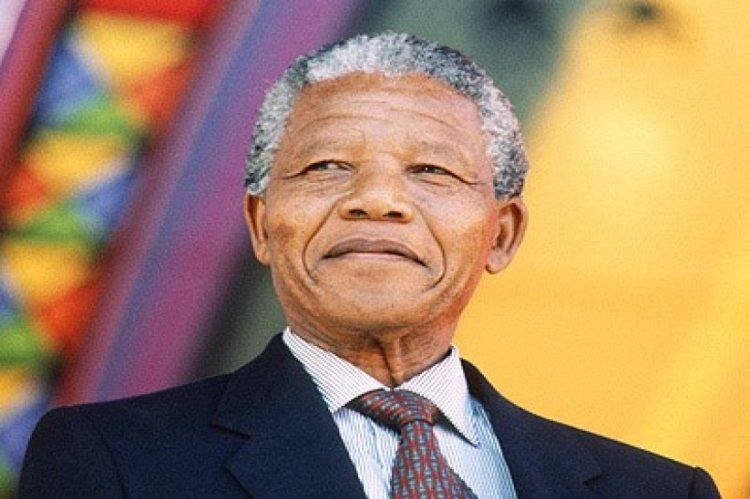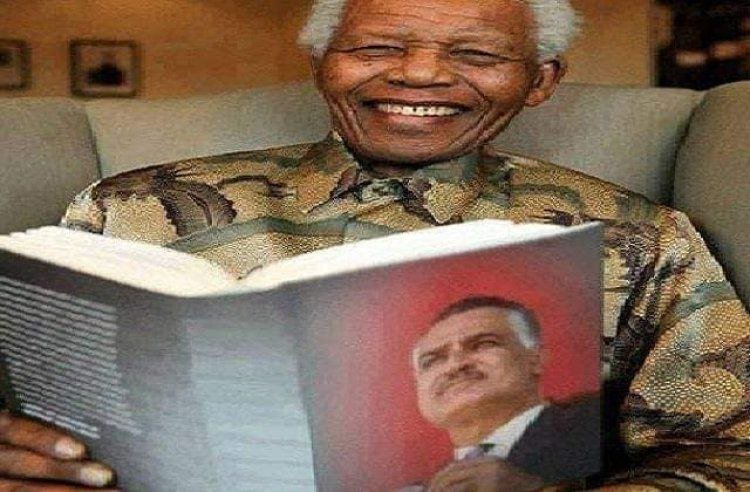Nelson Mandela…the first black president of South Africa
Reviewed by: Wafaa El-houseiny
Translated by: Aya Barakat
Nelson Mandela…the first black president of South Africa
"If I have destiny to visit Egypt, I would visit the pyramids, the great Nile, and the tomb of Gamal Abdel Nasser.” - Nelson Mandela
Nelson Mandela was born on July 18, 1918, in Mvezo, Umtata District, Transkei Province, South Africa. His birth name was "Rolihlahla Mandela" As for the name “Nelson” it was given to him by his primary school teacher, and African children at that time were given English names so that the British colonists at that time could pronounce them easily.
His father was a leader, and when he disagreed with the corrupt and the occupiers, they robbed him of his wealth and stripped him of his surname, and he died when Nelson was nine years old at that time. Nelson was cared for by a member of the Thembo tribe's ruling family.
Mandela traveled to the governor's residence and quickly adapted to the new environment. He studied geography, the English language, and history. He became interested in African history, especially when he had the opportunity to listen to the leaders of the various tribes when they came to the Grand Palace on official occasions.
Mandela was appointed advisor to the ruling family and received his secondary education at Clarkeborry boarding School. On one occasion, he said that his academic excellence was the result of the "hard work" of school days. Also, Mandela was superior in sports, specifically in running and boxing, but received ample mockery from his teammates due to his rural origin, but ultimately succeeded in making friends with many students, including Mathuna, his first female girlfriend.
Mandela joined the University of Fort Hare in 1939, and after a dispute with the university council, he transferred to the University of Johannesburg to study law. Mandela quickly became involved in the anti-racism movements from which his people had long suffered; Blacks did not have the right to vote or participate in political life, and the white “minority” government oppressed blacks, stripped them of their property, exiled them outside their provinces, and violated their human rights.
For 20 years, he led peaceful activities aimed at standing up to the government’s repressive policies, but when he realized the failure of these activities, he adopted the military force as the only way to achieve his goals.
He joined the African National Congress in 1942, the party was suffering from internal division because some of its members saw that peaceful activities were no longer useful in the face of the government's oppressive and arbitrary policies.
A shift occurred in Mandela’s point of view, and he embraced the idea that armed struggle was the only way to achieve the desired change. He participated with other activists in establishing the armed section of the African Congress Party, known as “Umkhonto we Sizwe". Also, in the same year, Mandela led a workers’ strike that lasted for three days, in 1961 AD. The authorities arrested him and sentenced him to five years in prison, but he was retried again in 1963 AD, and he was sentenced to life imprisonment.
Mandela spent 18 years of his 27 years in prison on Robben Island. In prison, he contracted tuberculosis due to deliberate denial of health care and ill-treatment. In 1982, Mandela was transferred with other ANC leaders to Pollsmoor Prison. Prison did not stand in the way of his university ambitions, so he obtained a bachelor’s degree in law through the correspondence system with the University of London.
He supported the liberation movements in the world, including the Algerian revolution, and he did not turn away from the crisis of his homeland. He was certain of victory and how could he not do it when he said: “One cannot be prepared for something while secretly believing that it will not happen.” He also said: “The chances of success are hidden in the folds of problems"…
This is one of the secrets of his psychological strength. “Reassuring” oneself in times of crisis, staying together and not rushing into decisions to get rid of the crisis, which is what we know from his saying: “May your choices reflect your hopes and not your fears,” and his saying: “Difficulties break some men and create others.” There is no ax sharp enough to wound the soul of the one who continues. Try and hope it works...
While he was a prisoner, he was able to "leak" messages in support of the resistance and spread enthusiasm among his people to combat racism. He said: "I can fight even in the enemy's castle," and stressed that surrendering to despair is the path to failure and certain death.
He suffered greatly in prison; At times, he was only allowed one visit and one letter every six months, and he spent long periods in solitary confinement. He participated in prison strikes to improve treatment and established relationships with prisoners of different specialties and experiences, benefiting them and their beneficiaries. He did not waste his time in prison, he said "We have to use time wisely and always realize that it is time to do what is right"
He eagerly waited for speeches from his family and when the prisoner gave them to him, he intentionally did not read them quickly; So the prisoner did not see his "vulnerability" to his family and used that to put pressure on him.
Mandela created his strength by confronting his fears and did not deny them. He declared: “The brave is not the one who has no fears, but rather the one who conquers his fears."
He rejected offers to release him in exchange for giving up the struggle, and how could he accept when he said: “There is no passion to be found in playing small, and in settling for a life that is less than what you can live."
In 1985, President Peter William Botha offered to release Mandela in exchange for his abandonment of the armed struggle, but of course, he refused. Negotiating sessions continued between the government and Mandela without achieving any agreement, until February 11, 1991, when it was announced that Mandela would be released after 27 years, and the abolition of death sentences in the country, as well as the removal of all restrictions imposed on political parties, including the African National Congress.
Nelson Mandela was elected president of the African National Congress in 1991, and negotiated with the country's president, Frederick William de Klerk, to hold the country's first multiracial elections.
In 1993, Mandela and Clerk won the Nobel Peace Prize for their joint work to end the apartheid system in South Africa. Thus, the first democratic elections were held in the country on April 27, 1944, making Mandela the first black-skinned president in the history of South Africa.
Mandela worked to protect the national economy from collapse and developed a plan for the country's reconstruction and development. Mandela signed the decree on the legislation of the country's new Constitution, and established a strong central government based on majority rule, guaranteeing the rights of minorities and freedom of expression. In 1996, when the general elections of 1990 came, Mandela announced his reluctance to stand and his desire to leave politics.
However, it continued its activities to raise funds for the construction of schools and health centers in rural South Africa. He also published several books recounting his suffering and struggle, including: "My Long Journey for Freedom."
Mandela officially announced his retirement from public life and returned to live in his village of Kono in 2004. Three years later, he met with several world leaders to establish a working group on addressing all crises and problems occurring in different countries, called the "Council of Wise Men", whose objectives were to promote peace in the world, achieve gender equality, and support initiatives to address humanitarian crises, as well as strengthen democracy.
Also, Mandela continued to fight the AIDS disease that was rampant in South Africa. He made his final public appearance in the 2010 World Cup final.
He has received several awards and accolades, including:
Sakharov Prize for Freedom of Thought 1988. -
Nobel Prize for Peace in 1993. -
United States Presidential Medal of Freedom. -
Order of Canada. -
Lenin Prize for Peace from the Soviet Union. -
Congress Gold Medal 1998 AD. -
Ataturk Prize for Peace from Türkiye in 1999. -
- Queen Elizabeth II awarded him the Grand Cross, the Order of Saint John, and the Order of Merit.
Gandhi Prize for Peace 2001 AD.-
Archer Ash Bravery Award 2009.-
He was honored at more than fifty universities, including Harvard and Brown University, and many films depicted his inspiring biography.
He died on December 5, 2013, at the age of ninety-five.



